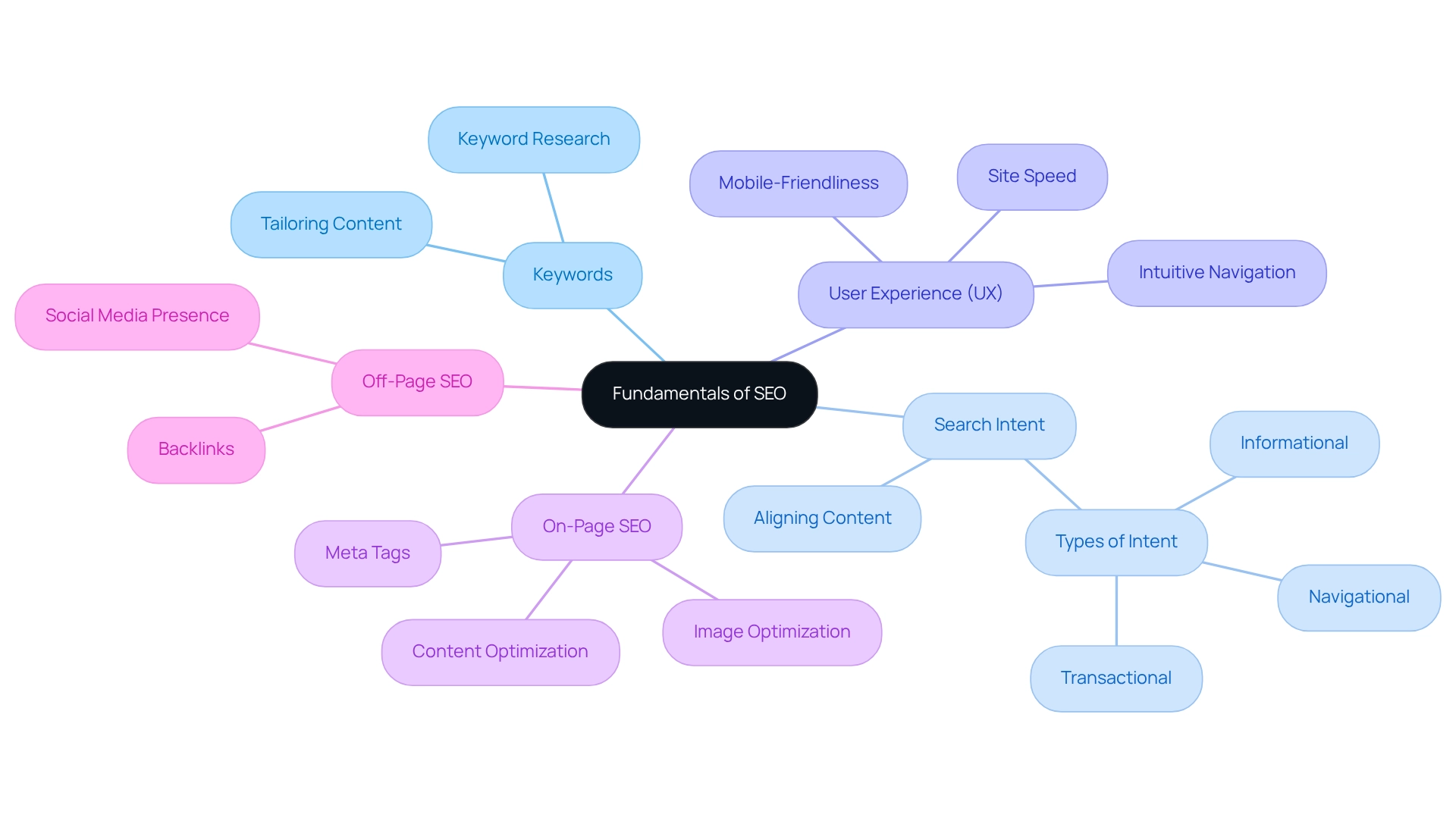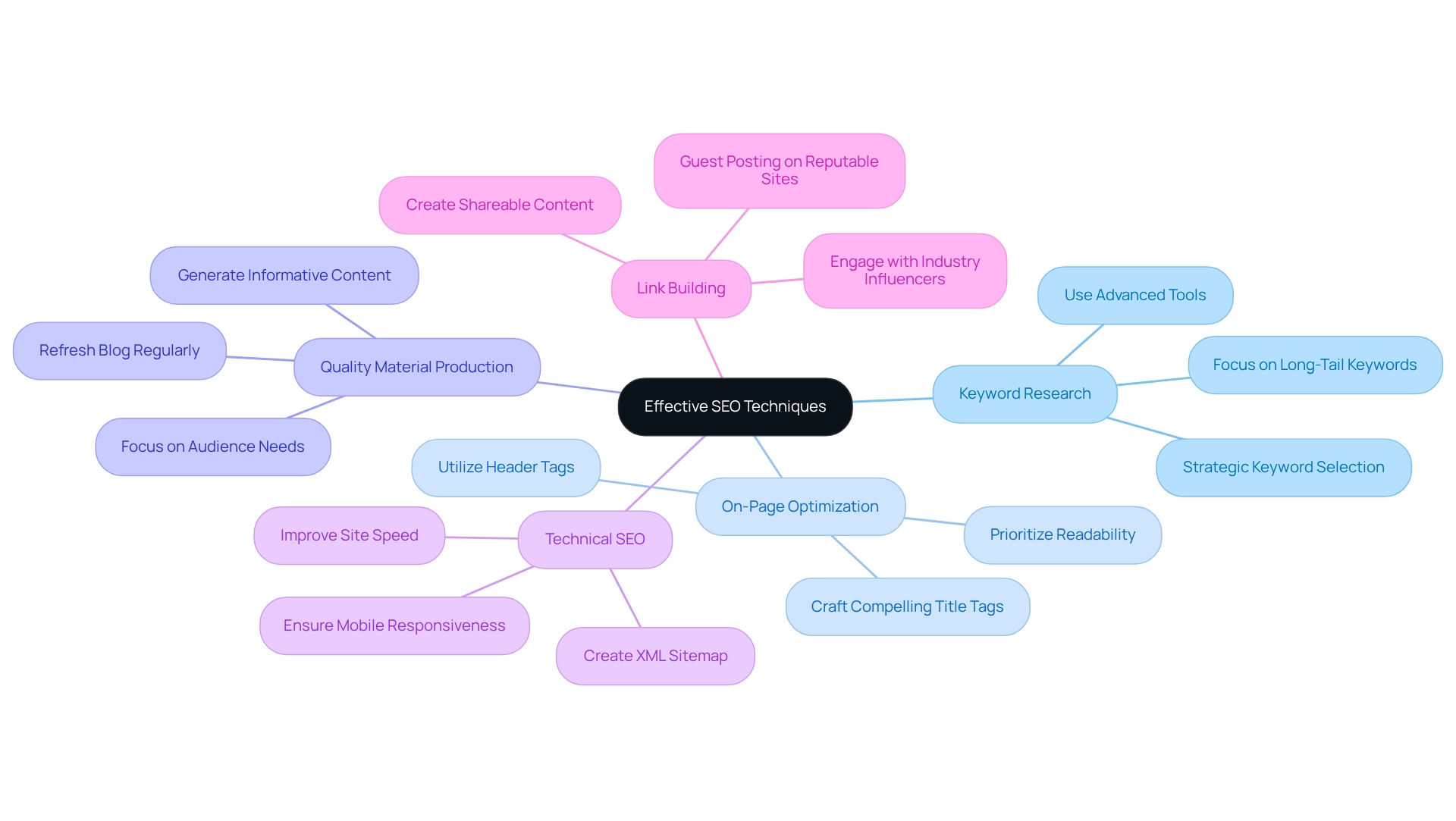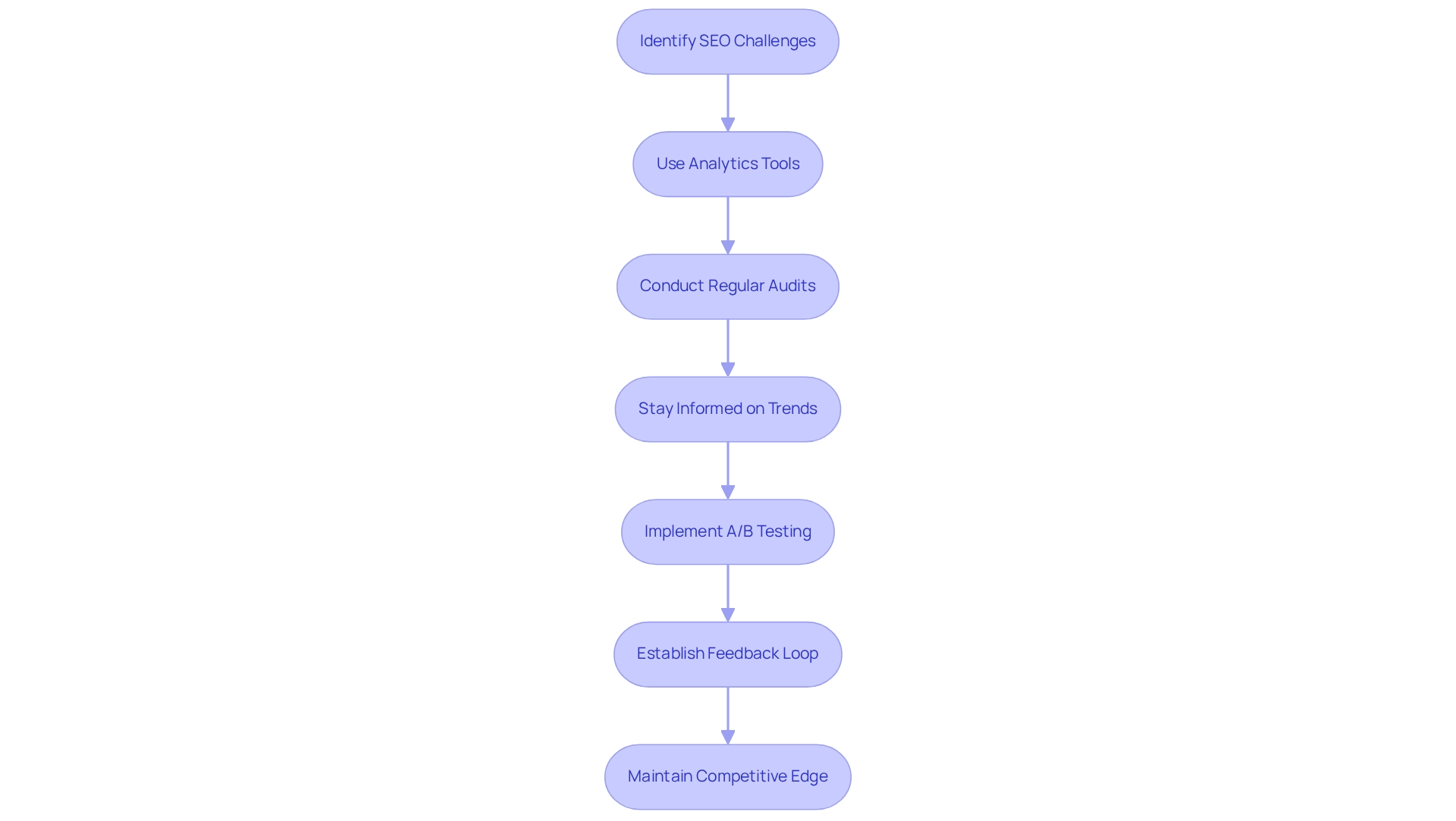Overview
Mastering search engine optimization (SEO) for websites can feel overwhelming for many. The challenge of ensuring your site is visible amidst the vast online landscape is a common pain point. It’s understandable to worry about how to attract organic traffic when competition is fierce. However, by focusing on essential strategies like:
- Thorough keyword research
- Understanding search intent
- Enhancing user experience
you can take meaningful steps toward improving your website's visibility.
Imagine the relief of seeing your site rise in search engine results, drawing in more visitors who genuinely connect with your content. By implementing both on-page and off-page techniques, you can significantly enhance your online presence. Remember, you’re not alone in this journey; many have faced similar challenges and found success through these core components. Embrace this opportunity to nurture your website's potential, and watch as it transforms into a valuable resource for your audience.
Introduction
In today's digital landscape, many tech startup founders find themselves grappling with the challenge of mastering Search Engine Optimization (SEO). It’s a daunting task, especially as competition grows fiercer by the day. Without a solid understanding of SEO, the risk of being overlooked online looms large, making it difficult to attract the organic traffic essential for growth.
This article aims to explore the fundamental components of SEO, share effective techniques for implementation, and highlight the importance of monitoring and adapting strategies to thrive in this ever-changing environment.
From keyword research to link building, each element is vital in enhancing a website's performance in search engine results. For those eager to carve out their niche, embracing these strategies isn’t just beneficial—it’s a crucial step toward long-term success.
Remember, you’re not alone in this journey; together, we can navigate the complexities of SEO and unlock the potential for your business to shine online.
Understand the Fundamentals of SEO
For many website owners, can often feel overwhelming, especially when striving for visibility in search engine results pages (SERPs). The challenge lies not just in understanding SEO, but in mastering its core components to truly connect with potential customers.
Consider the role of Keywords. These terms and phrases are what users type into search engines when seeking information. is essential; it helps uncover what your potential customers are genuinely searching for. By identifying these keywords, you can tailor your content to meet their needs, creating a more meaningful connection.
Next, let’s think about Search Intent. Understanding why someone is searching is crucial. Are they looking for information, ready to make a purchase, or trying to find a specific online location? Aligning your content with user intent not only enhances engagement but also boosts conversion rates, making your efforts feel more rewarding.
Additionally, we cannot overlook the importance of User Experience (UX). Search engines prioritize websites that offer a positive experience. Factors like site speed, mobile-friendliness, and intuitive navigation are vital in SEO rankings. A well-designed platform draws visitors in and keeps them engaged, creating a welcoming space that encourages exploration.
Then there’s the distinction between On-Page and Off-Page SEO. On-page SEO focuses on enhancing individual pages of your website, including text, meta tags, and images. Off-page SEO is a crucial part of [search engine optimization for websites](https://blog.rno1.com/master-social-media-and-b-2-b-marketing-for-startup-success), encompassing external elements like backlinks and social media presence that contribute to your site's authority and ranking. By embracing these fundamental aspects of search engine optimization for websites, brands can build a strong foundation for their strategy, ensuring they are positioned to attract organic traffic. Remember, the journey through SEO doesn’t have to be lonely; by understanding and implementing these principles, you can foster a thriving online presence that resonates with your audience.

Implement Effective SEO Techniques
To effectively implement for websites, tech startups often face the challenge of standing out in a crowded digital landscape. It can feel overwhelming, but there are techniques that can help ease this burden and pave the way for success:
- : Start by leveraging advanced tools such as Google Keyword Planner and Ahrefs to uncover relevant keywords that resonate with your audience. Focus on long-tail keywords specific to your niche, as they typically yield higher conversion rates. In 2025, 72% of marketers stress that is the most effective SEO tactic, underscoring the significance of strategic keyword selection. Remember, utilizing keyword research tools effectively is essential for optimizing your SEO strategies.
- : Each page on your website deserves meticulous attention to ensure it is optimized for its target keywords. This includes crafting compelling title tags and meta descriptions that seamlessly incorporate keywords, utilizing header tags (H1, H2, H3) to organize material, and naturally weaving keywords into your content while prioritizing readability and engagement. Successful on-page optimization examples demonstrate and user experience, showing that your efforts can truly pay off.
- : Concentrate on generating high-quality, informative materials that directly cater to the needs and inquiries of your target audience. Consistently refreshing your blog or resource section is essential for staying relevant and up-to-date. In fact, 71% of marketers indicate that marketing through information has increased in importance. As someone who understands the intricacies of SEO, I truly appreciate the value of high-quality material, and I encourage you to prioritize this in your strategy.
- Technical SEO: Don't overlook the . Improving site speed, ensuring mobile responsiveness, and creating an XML sitemap are vital steps. Tools like Google Search Console can be invaluable for identifying and rectifying technical issues that could hinder your SEO efforts, allowing you to create a smoother experience for your users.
- : Establish a strong backlink profile by engaging with industry influencers, guest posting on reputable sites, and creating shareable content. Valuable backlinks are crucial, as they signal to indexing systems that your site is authoritative and reliable. As e-commerce is projected to capture 41% of global retail sales by 2027, cultivating a robust online presence is more critical than ever. Additionally, consider diversifying your marketing efforts to include discovery-based platforms like TikTok and Instagram to reach younger audiences, as highlighted in the case study titled "The Shift in Search Engine Dynamics."
By implementing these techniques, tech startups can significantly enhance their visibility in search results through search engine optimization for websites and attract a larger share of organic traffic. Remember, investing in AI is becoming essential for staying competitive in SEO, ensuring that you remain at the forefront of . You are not alone in this journey; with the right strategies, you can thrive in this ever-evolving landscape.

Monitor and Adapt Your SEO Strategy
To ensure your strategy remains effective, it’s essential to recognize the challenges you may face and adapt your approach accordingly.
One common issue is the lack of insight into your performance. Utilizing can be a game changer. By tracking key performance indicators (KPIs) such as organic traffic, bounce rates, and conversion rates, you can gain valuable insights into your SEO efforts. Regularly reviewing these metrics is crucial. Did you know that ? This statistic underscores the importance of a robust analytics strategy to improve your visibility and connect with your audience.
Another challenge is . Conducting regular audits for search engine optimization for websites can help you identify areas that need improvement. This includes checking for broken links, duplicate content, and other technical issues that could hinder your SEO performance. Routine evaluations are vital; they can significantly influence your website rankings and overall online visibility, which is essential for effective search engine optimization for websites. It’s also important to stay informed on search engine optimization for websites trends. The landscape is ever-changing, and from search engines is essential. Resources like Moz and Search Engine Journal provide valuable insights into emerging best practices in search engine optimization for websites, helping you ensure your strategies remain relevant. Consistently refreshing your material is key to preserving its relevance and precision.
You might also . Experimenting with different strategies, such as changing format types or adjusting call-to-action placements, can help you identify what resonates best with your audience, leading to a more refined approach.
is another important step. Encouraging user feedback and analyzing customer behavior on your site can yield critical insights into what works and what may need adjustment. As many content marketers suggest, prioritizing sustainability over speed in your search engine optimization for websites efforts can lead to more meaningful engagement. Case studies have shown that and overall traffic, emphasizing the . While structured data itself isn’t a direct ranking factor, its implementation can significantly boost your visibility in search results, which is essential for effective search engine optimization for websites. By continuously monitoring and adapting , you can maintain a competitive edge and ensure sustained growth in organic traffic. Incorporating expert opinions on monitoring SEO strategies in 2025 can further enhance your approach, providing a forward-looking perspective that resonates with the needs of tech startups. Remember, you’re not alone in this journey; many founders face similar challenges, and together we can navigate the complexities of SEO.

Conclusion
Mastering SEO can feel overwhelming for tech startups, often presenting a multifaceted challenge that demands a solid grasp of its core components, effective implementation techniques, and an unwavering commitment to ongoing monitoring and adaptation. The journey begins with understanding the fundamentals—keyword research, search intent, user experience, and both on-page and off-page strategies. By embracing these essentials, startups can build a strong foundation for their digital presence.
However, the path to effective SEO is not without its hurdles. Implementing meticulous on-page optimization, creating quality content, and engaging in strategic link building are crucial steps that enhance visibility in a competitive digital landscape. It’s easy to feel lost amidst the noise, but remember, leveraging the right tools and strategies can help attract organic traffic while fostering meaningful engagement with users. Investing in technical SEO and staying attuned to emerging trends can significantly influence a startup's success.
Yet, the importance of continuous monitoring and adaptation cannot be overstated. Utilizing analytics tools, conducting regular audits, and embracing A/B testing are essential practices for refining SEO strategies. By remaining informed and responsive to changes in the SEO environment, brands not only maintain a competitive edge but also nurture sustained growth in their online visibility.
Ultimately, embracing SEO is not merely an option; it is a necessity for tech startups aspiring to achieve long-term success. By committing to these strategies, businesses can unlock their full potential in the digital realm, ensuring they not only survive but thrive amidst the challenges of an ever-evolving landscape. Remember, you are not alone in this journey—support and resources are available to guide you every step of the way.
Frequently Asked Questions
What is the main challenge website owners face regarding search engine optimization (SEO)?
The main challenge for website owners is not only understanding SEO but also mastering its core components to connect effectively with potential customers.
Why are keywords important in SEO?
Keywords are the terms and phrases users type into search engines. Conducting thorough keyword research helps uncover what potential customers are searching for, allowing website owners to tailor their content to meet those needs.
What is search intent, and why is it significant?
Search intent refers to the reason behind a user's search, such as seeking information, making a purchase, or finding a specific location. Understanding search intent is crucial as it helps align content with user needs, enhancing engagement and boosting conversion rates.
How does user experience (UX) impact SEO?
User experience impacts SEO because search engines prioritize websites that offer a positive experience. Factors like site speed, mobile-friendliness, and intuitive navigation are essential for improving SEO rankings.
What is the difference between on-page SEO and off-page SEO?
On-page SEO focuses on enhancing individual pages of a website, including elements like text, meta tags, and images. Off-page SEO involves external factors such as backlinks and social media presence that contribute to a site's authority and ranking.
How can understanding SEO principles benefit brands?
By understanding and implementing SEO principles, brands can build a strong foundation for their strategy, ensuring they attract organic traffic and foster a thriving online presence that resonates with their audience.




